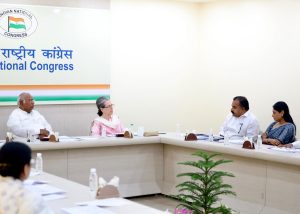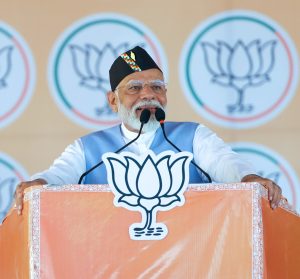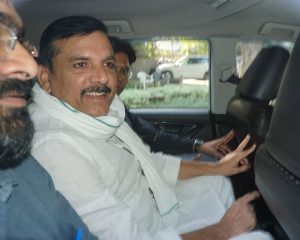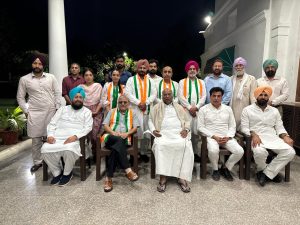Prime Minister of India urges all political parties to enable smooth Budget Session of Parliament
Prime Minister of India urges all political parties to enable smooth Budget Session of Parliament
NEW DELHI (INDIA): Addressing floor leaders of parties in the Rajya Sabha and Lok Sabha here today, ahead of Budget Session of Parliament beginning tomorrow, Prime Minister of India Narendra Modi noted that in order to preserve and enrich the institution of Democracy in India, it is imperative that both the Houses of the Parliament run without disruption and constructive discussion takes place on issues of national importance.nnShri Modi urged leaders of all the political parties to rise above party lines to cooperate with the Government and hoped that the experience of the last Winter session is not repeated. The Prime Minister also noted that knowledge is not limited to the treasury benches and it rather emanates from all the members of both Houses and hence, the session should be used constructively and differences be resolved by consensus.nnResponding to observations of different leaders on advancing of the Budget Session 2017 and presenting the Budget before start of polling in five poll bound States, Finance Minister Arun Jaitley asserted that this decision was a well thought of step and was discussed in detail in the Cabinet.nnFurther, he informed that the decision to this effect was taken by the Cabinet over six months back and is based on sound financial principles that would lead to efficient utilization of finances under different Centre and State Government schemes.nnJaitley also assured all the parties that the Government will observe discipline and will abide by Election Commission guidelines regarding level playing field for all parties in poll bound States.nnA host of issues were brought up by the leaders of parties during the meeting including withdrawal of high value currency notes, advancing of Budget presentation, increasing the number of sitting days of the Parliament and holding another meeting of leaders of all parties before the start of second part of the Budget Session 2017. There was a consensus across party lines on ensuring smooth functioning of the Parliament without disruptions and deadlocks to be resolved through constructive discussions in both the Houses.nnUnion Minister of Parliamentary Affairs, Ananth Kumar, later briefing media persons said that all parties, especially the opposition, were in favour of a productive Budget session. He informed that the Government?s legislative agenda for the 31 sittings of the Budget Session includes 40 Bills consisting of 1 Bill relating to Supplementary Demands for General Budget.nnItems of Government Business Identified for being taken up in both the Houses of Parliament during this Budget Session, 2017:nnI Bills for replacing Ordinancesn1. The Enemy Property (Amendment and Validation) Bill, 2016, as passed by Lok Sabha and as reported by Select Committee of Rajya Sabhan2. The Payment of Wages (Amendment) Bill, 2017n3. The Specified Bank Notes (Cessation of Liabilities) Bill, 2017nnII Bills for Introduction, Consideration and Passingnn1. The Finance Bill, 2017n2. The Indian Institute of Management Bill, 2017n3. The Inter-State River Water Disputes (Amendment), Bill, 2017n4. The Repealing and Amending Bill, 2017n5. The Representation of the People (Amendment) Bill, 2017n6. The Securities and Exchange Board of India (Amendment) Bill, 2017n7. The Aircraft (Amendment) Bill, 2017n8. The Anti-Maritime Piracy Bill, 2017n9. The Chit Funds (Amendment) Bill, 2017n10. The Collection of Statistic (Amendment) Bill, 2017n11. The Constitution (Scheduled Castes) Orders (Amendment) Bill, 2017n12. The Central Goods & Service Tax Bill, 2016;n13. The Integrated Goods & Service Tax Bill, 2016;n14. The Goods & Services Tax (Compensation for loss of revenue) Bill, 2016n15. The Divorce (Amendment) Bill, 2017n16. The Footwear Design and Development Institute Bill, 2017n17. The Financial Resolution and Deposit Insurance (FRDI) Bill, 2017n18. The High Court and the Supreme Court Judges (Salaries and Conditions of Service) Amendment Bill, 2017n19. The Indian National Defence University Bill, 2017n20. The Medical Termination of Pregnancy (Amendment) Bill, 2017n21. The Right of Children to Free and Compulsory Education (Amendment) Bill, 2017nnIII Bills for Consideration and Passingnn(A) Bills pending in Lok Sabhan1. The Mental Health Care Bill, 2016, as passed by Rajya Sabhan2. The Maternity Benefit (Amendment) Bill, 2016, as passed by Rajya Sabhan3. The Motor Vehicles (Amendment) Bill, 2016n4. The Admiralty (Jurisdiction and Settlement of Maritime Claims) Bill, 2016n5. The National Institute of Technology, Science Education and Research (Second Amendment) Bill, 2016n6. The Constitution (Scheduled Castes and Scheduled Tribes) Order (Amendment) Bill, 2016n7. The Consumer Protection Bill, 2015nn(B) Bills pending in Rajya Sabhan1. The Whistle Blowers Protection (Amendment) Bill, 2015, as passed by Lok Sabhan2. The Factories (Amendment) Bill, 2016, as passed by Lok Sabhan3. The Employees Compensation (Amendment) Bill, 2016, as passed by Lok Sabhan4. The Prevention of Corruption (Amendment) Bill, 2013n5. The Armed Forces Tribunal (Amendment) Bill, 2012n6. The Human Immunodeficiency Virus and Acquired Immune Deficiency Syndrome (Prevention and Control) Bill, 2014nnIV Financial Businessn1. Third Supplementary Demands for Grants (General) for 2016-17;n2. Demands for Grants for 2017-18;nnV Bills for Withdrawal (in Lok Sabha)n1. The Payment of Wages (Amendment) Bill, 2016




